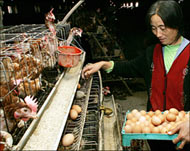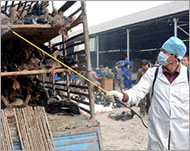Ninth bird flu death in Indonesia
Indonesia has confirmed its ninth human death from bird flu, taking the global toll from the disease to 71, all in Asia.

A Hong Kong laboratory, affiliated with the World Health Organisation, confirmed the Indonesian Health Ministry’s announcement on Tuesday that an Indonesian had died from the deadly H5N1 strain of bird flu, which scientists fear will mutate into an easily spread human virus and spark a pandemic in which millions could die.
Commenting on the results of tests on a 35-year-old man who died last month, Hariadi Wibisono said “we have received confirmation. (The toll) is now nine”.
Another senior Health Ministry official said the man lived in West Jakarta where he had contact with live chickens that carried the H5N1 virus.
“He was building his house and around it there were many chickens and birds running around. Researchers tested those birds and they were positive” carriers of H5N1, said I Nyoman Kandun, director-general of disease control at the ministry.
Family being watched
WHO spokeswoman Maria Cheng told Reuters in Geneva people close to the man were under observation and samples had been taken for further testing.
 |
|
The strain affects birds in two- |
His wife and parents tested negative, but his son had a fever, she said.
The H5N1 strain has killed 71 out of 138 people known to have been infected.
Five other people have been confirmed to have contracted the virus in Indonesia but have survived.
The highly pathogenic strain is endemic in poultry in parts of Asia, and has affected birds in two-thirds of the provinces in Indonesia, an archipelago of 17,000 islands and 220 million people.
The country has millions of chickens and ducks, many in the backyards of rural or urban homes.
Westwards spread
Migrating birds have spread H5N1 into Europe.
Romania registered new suspicious poultry deaths in a region west of the Danube delta, leading to thousands more birds being culled, officials said on Tuesday.
 |
|
Germany is to relax bird flu |
Four H5N1 outbreaks have been confirmed in the country since October.
But initial fears of the disease sweeping rapidly westwards appear to have lessened.
Germany is to relax bird flu regulations and allow poultry to be kept in the open from Friday, the Agriculture Ministry said.
The government confined all poultry to pens in mid-October after bird flu was discovered in Romania, Turkey and Russia.
With the main migration season now over, Germany’s Friedrich Loeffler scientific institute has cut its assessment of the risk migrating birds will spread the disease to Germany from “high to moderate” to “low”.
Campaign
Separately, WHO Regional Director for Southeast Asia Samlee Plianbangchang said in Jakarta that Indonesia’s agriculture and health ministries should work together to prevent the virus from infecting more people there.
“We have to make sure there will be no transmission of the bird flu virus from chicken to man. Therefore, we have to control bird flu in chickens, then automatically bird flu in man is under control” Samlee Plianbangchang |
He was speaking during a visit to recognise the Indonesian Health Ministry for its work after last December’s tsunami.
Plianbangchang said culling was not effective for the cash-strapped country, due to the high number of backyard fowl, and vaccinating birds may be a better approach.
“We have to make sure there will be no transmission of the bird flu virus from chicken to man.
Therefore, we have to control bird flu in chickens, then automatically bird flu in man is under control,” he said.
Jakarta is preparing a bird flu warning system aimed at reaching remote areas to speed up reporting of any outbreaks.
The “village preparedness policy” involves local governments setting up health posts in all villages, where personnel including doctors would be alert to flu cases in birds and humans, particularly in infected areas.